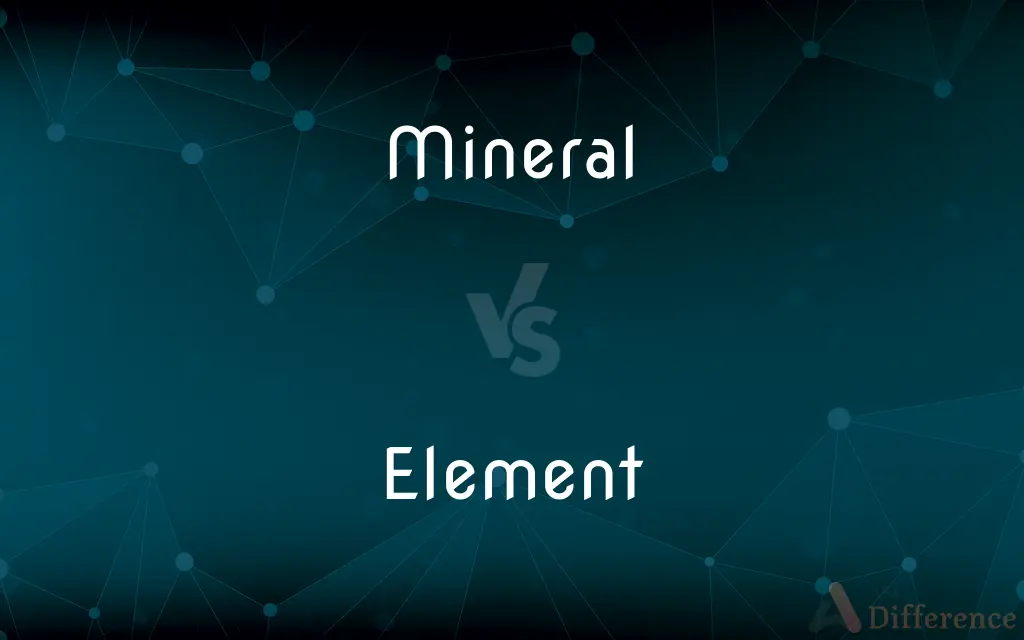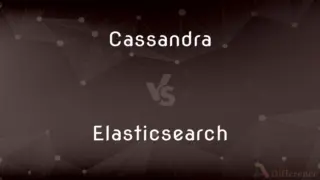Mineral vs. Element — What's the Difference?
Edited by Tayyaba Rehman — By Fiza Rafique — Updated on October 13, 2023
Minerals are naturally occurring inorganic substances with a specific chemical composition and structure, while elements are pure substances consisting of a single type of atom.

Difference Between Mineral and Element
Table of Contents
ADVERTISEMENT
Key Differences
Minerals are defined as inorganic substances that occur naturally in the earth, possessing a characteristic crystalline structure and chemical composition. Elements represent the simplest form of matter, characterized by atoms that contain the same number of protons.
Minerals can be composed of one element or a combination of elements, meaning they can be either homogeneous or heterogeneous at the atomic level. Elements are always homogeneous as they consist solely of one type of atom.
In terms of physical characteristics, minerals can exhibit a wide range of colors, lusters, and forms due to their varied chemical compositions and crystalline structures. Elements, when isolated, will exhibit properties unique to their atomic structure, such as density and melting point.
Minerals are crucial for various industrial processes and also hold importance for biological functions. Elements, being fundamental forms of matter, comprise all substances and are fundamental in every chemical, physical, and biological process.
Minerals are typically identified through various characteristics, including their hardness, streak, luster, and cleavage. Elements are identified through their atomic number, which is determined by the number of protons in their atomic nuclei.
ADVERTISEMENT
Comparison Chart
Difference Aspect
Mineral
Element
Basic Definition
Inorganic, naturally occurring substance
Simplest form of matter with identical atoms
Composition
One or more elements in a specific ratio
Consists of only one type of atom
Occurrence
Naturally occurring in Earth’s crust
Can be found naturally or be synthesized
Application
Industrial processes, nutrition, etc.
Everywhere: compounds, alloys, etc.
Identification
Hardness, streak, luster, cleavage
Atomic number, physical and chemical props
Compare with Definitions
Mineral
Minerals have an ordered atomic arrangement.
The crystal lattice of a mineral affects its properties.
Element
An element is a substance composed of identical atoms.
Oxygen is a vital element for life.
Mineral
They are typically homogeneous substances.
A mineral has a consistent composition throughout.
Element
Elements cannot be broken down into simpler substances.
Gold, an element, cannot be simplified further.
Mineral
In geology and mineralogy, a mineral or mineral species is, broadly speaking, a solid chemical compound with a fairly well-defined chemical composition and a specific crystal structure that occurs naturally in pure form.The geological definition of mineral normally excludes compounds that occur only in living beings. However some minerals are often biogenic (such as calcite) or are organic compounds in the sense of chemistry (such as mellite).
Element
Each element has a unique atomic number.
Carbon's atomic number is 6.
Mineral
A naturally occurring, homogeneous inorganic solid substance having a definite chemical composition and characteristic crystalline structure, color, and hardness.
Element
Elements can exist in different forms, called allotropes.
Carbon is found as graphite and diamond.
Mineral
An element, such as gold or silver.
Element
A fundamental, essential, or irreducible constituent of a composite entity.
Mineral
An organic derivative, such as coal or petroleum.
Element
Elements The basic assumptions or principles of a subject.
Mineral
A substance, such as stone, sand, salt, or coal, that is extracted or obtained from the ground or water and used in economic activities.
Element
A member of a set.
Mineral
A substance that is neither animal nor vegetable; inorganic matter.
Element
A point, line, or plane.
Mineral
An inorganic element, such as calcium, iron, potassium, sodium, or zinc, that is essential to the nutrition of humans, animals, and plants.
Element
A part of a geometric configuration, such as an angle in a triangle.
Mineral
An ore.
Element
The generatrix of a geometric figure.
Mineral
Minerals Mineral water.
Element
Any of the terms in the rectangular array of terms that constitute a matrix or determinant.
Mineral
A soft drink.
Element
Chemistry & Physics A substance composed of atoms having an identical number of protons in each nucleus. Elements cannot be reduced to simpler substances by normal chemical means. See Periodic Table.
Mineral
Of or relating to minerals
A mineral deposit.
Element
One of four substances, earth, air, fire, or water, formerly regarded as a fundamental constituent of the universe.
Mineral
Impregnated with minerals.
Element
(Electricity)The resistance wire in an electrical appliance such as a heater or an oven.
Mineral
(geology) Any naturally occurring inorganic material that has a (more or less) definite chemical composition and characteristic physical properties.
Element
Elements The forces that constitute the weather, especially severe or inclement weather:outside paint that had been damaged by the elements.
Mineral
Any inorganic material (as distinguished from animal or vegetable).
Element
An environment naturally suited to or associated with an individual:He is in his element when traveling. The business world is her element.
Mineral
(nutrition) Any inorganic element that is essential to nutrition; a dietary mineral.
Element
A distinct group within a larger community:the dissident element on campus.
Mineral
(British) Mineral water.
Element
A ground unit in an air force comparable to a platoon.
Mineral
A soft drink, particularly a single serve bottle or can.
Element
A unit of an air force equal to two or three aircraft.
Mineral
(obsolete) A mine or mineral deposit.
Element
Elements The bread and wine of the Eucharist.
Mineral
(obsolete) A poisonous or dangerous substance.
Element
One of the simplest or essential parts or principles of which anything consists, or upon which the constitution or fundamental powers of anything are based.
Letters are the elements of written language.
Mineral
Of, related to, or containing minerals
Element
(chemistry) Any one of the simplest chemical substances that cannot be decomposed in a chemical reaction or by any chemical means and made up of atoms all having the same number of protons.
Mineral
An inorganic species or substance occurring in nature, having a definite chemical composition and usually a distinct crystalline form. Rocks, except certain glassy igneous forms, are either simple minerals or aggregates of minerals.
Element
One of the four basic building blocks of matter in theories of ancient philosophers and alchemists: water, earth, fire, and air.
Mineral
A mine.
Element
A basic, simple substance out of which something is made, raw material.
Mineral
Anything which is neither animal nor vegetable, as in the most general classification of things into three kingdoms (animal, vegetable, and mineral).
Element
(legal) A required aspect or component of a cause of action. A deed is regarded as a violation of law only if each element can be proved.
Mineral
Of or pertaining to minerals; consisting of a mineral or of minerals; as, a mineral substance.
Element
(set theory) One of the objects in a set.
Mineral
Impregnated with minerals; as, mineral waters.
Element
(mathematics) One of the entries of a matrix.
Mineral
Solid homogeneous inorganic substances occurring in nature having a definite chemical composition
Element
Any of the teeth of a zip fastener.
Mineral
Relating to minerals;
Mineral elements
Mineral deposits
Element
A small part of the whole.
An element of the picture
Mineral
Of or containing or derived from minerals;
A mineral deposit
Mineral water
Decaying vegetable matter
Element
A small but present amount of a quality, a hint.
An element of doubt
Mineral
Composed of matter other than plant or animal;
The inorganic mineral world
Element
A factor, one of the conditions contributing to a result.
Mineral
A mineral is a naturally occurring inorganic solid.
Quartz is a common mineral.
Element
(obsolete) The sky.
Mineral
Minerals possess a definite chemical structure.
Every mineral has a unique chemical formula.
Element
(obsolete) Any one of the heavenly spheres believed to carry the celestial bodies.
Mineral
Minerals are identified through various physical properties.
The hardness of a mineral helps in its identification.
Element
Atmospheric forces such as strong winds and rains.
Exposed to the elements
Element
A place or state of being that an individual or object is best suited to.
To be in one's element
Element
The bread and wine taken at Holy Communion.
Element
A group of people within a larger group having a particular common characteristic.
You sometimes find the hooligan element at football matches.
Element
(in the plural only) The basic principles of a field of knowledge, basics, fundamentals, rudiments.
Element
A component in electrical equipment, often in the form of a coil, having a high resistance, thereby generating heat when a current is passed through it.
The element in this electric kettle can heat the water in under a minute.
Element
(mathematics) An infinitesimal interval of a quantity, a differential.
The element of area in Cartesian coordinates is dx dy.
Element
(astronomy) An orbital element; one of the parameters needed to uniquely specify a particular orbit.
Element
(computing) One of the conceptual objects in a markup language, usually represented in text by tags.
Element
(obsolete) To compound of elements.
Element
(obsolete) To constitute and be the elements of.
Element
One of the simplest or essential parts or principles of which anything consists, or upon which the constitution or fundamental powers of anything are based.
Element
One of the ultimate, undecomposable constituents of any kind of matter. Specifically: (Chem.) A substance which cannot be decomposed into different kinds of matter by any means at present employed; as, the elements of water are oxygen and hydrogen.
Element
One of the ultimate parts which are variously combined in anything; as, letters are the elements of written language; hence, also, a simple portion of that which is complex, as a shaft, lever, wheel, or any simple part in a machine; one of the essential ingredients of any mixture; a constituent part; as, quartz, feldspar, and mica are the elements of granite.
The simplicity which is so large an element in a noble nature was laughed to scorn.
Element
One out of several parts combined in a system of aggregation, when each is of the nature of the whole; as, a single cell is an element of the honeycomb.
Element
One of the simplest essential parts, more commonly called cells, of which animal and vegetable organisms, or their tissues and organs, are composed.
Element
An infinitesimal part of anything of the same nature as the entire magnitude considered; as, in a solid an element may be the infinitesimal portion between any two planes that are separated an indefinitely small distance. In the calculus, element is sometimes used as synonymous with differential.
Element
One of the necessary data or values upon which a system of calculations depends, or general conclusions are based; as, the elements of a planet's orbit.
Element
The simplest or fundamental principles of any system in philosophy, science, or art; rudiments; as, the elements of geometry, or of music.
Element
Any outline or sketch, regarded as containing the fundamental ideas or features of the thing in question; as, the elements of a plan.
Element
One of the simple substances, as supposed by the ancient philosophers; one of the imaginary principles of matter.
Of elementsThe grosser feeds the purer: Earth the Sea;Earth and the Sea feed Air; the Air those FiresEthereal.
Does not our life consist of the four elements?
And the complexion of the element [i. e.,the sky or air]In favor's like the work we have in hand,Most bloody, fiery, and most terrible.
About twelve ounces [of food], with mere element for drink.
They show that they are out of their element.
Element
The conditions and movements of the air.
Element
The whole material composing the world.
The elements shall melt with fervent heat.
Element
The bread and wine used in the eucharist or Lord's supper.
Element
To compound of elements or first principles.
Element
To constitute; to make up with elements.
His very soul was elemented of nothing but sadness.
Element
An abstract part of something;
Jealousy was a component of his character
Two constituents of a musical composition are melody and harmony
The grammatical elements of a sentence
A key factor in her success
Humor: an effective ingredient of a speech
Element
Any of the more than 100 known substances (of which 92 occur naturally) that cannot be separated into simpler substances and that singly or in combination constitute all matter
Element
An artifact that is one of the individual parts of which a composite entity is made up; especially a part that can be separated from or attached to a system;
Spare components for cars
A component or constituent element of a system
Element
One of four substances thought in ancient and medieval cosmology to constitute the physical universe;
The alchemists believed that there were four elements
Element
The most favorable environment for a plant or animal;
Water is the element of fishes
Element
The situation in which you are happiest and most effective;
In your element
Element
A straight line that generates a cylinder or cone
Element
Elements combine to form compounds.
Water is formed by combining hydrogen and oxygen elements.
Common Curiosities
Are minerals only found in the earth's crust?
Primarily, but they can be in meteorites too.
Can an element be part of a mineral?
Yes, minerals can contain one or more elements.
Is a mineral always composed of one element?
No, minerals can be compounds.
Can elements be synthesized?
Yes, some elements can be synthesized.
Can minerals be organic?
No, minerals are inorganic by definition.
How many known elements are there?
As of now, 118 elements are recognized.
Are minerals important for organisms?
Yes, some minerals are vital for biological processes.
How are minerals classified?
Based on properties like luster, hardness, etc.
Is every element a mineral?
No, elements and minerals are distinct.
Are elements found in the periodic table?
Yes, each element has a place in the periodic table.
Are all minerals solids?
Yes, minerals are defined as solids.
Can elements combine to form minerals?
Yes, elements can combine to form minerals.
Can elements be liquids or gases?
Yes, like mercury (liquid) and helium (gas).
Can elements exhibit allotropy?
Yes, like carbon with graphite and diamond.
Are minerals found in rocks?
Yes, minerals are the building blocks of rocks.
Share Your Discovery

Previous Comparison
Cassandra vs. Elasticsearch
Next Comparison
Advisory vs. ConsultingAuthor Spotlight
Written by
Fiza RafiqueFiza Rafique is a skilled content writer at AskDifference.com, where she meticulously refines and enhances written pieces. Drawing from her vast editorial expertise, Fiza ensures clarity, accuracy, and precision in every article. Passionate about language, she continually seeks to elevate the quality of content for readers worldwide.
Edited by
Tayyaba RehmanTayyaba Rehman is a distinguished writer, currently serving as a primary contributor to askdifference.com. As a researcher in semantics and etymology, Tayyaba's passion for the complexity of languages and their distinctions has found a perfect home on the platform. Tayyaba delves into the intricacies of language, distinguishing between commonly confused words and phrases, thereby providing clarity for readers worldwide.














































